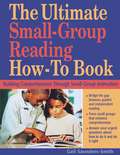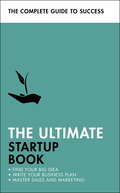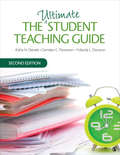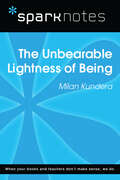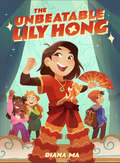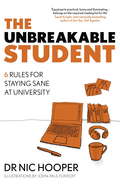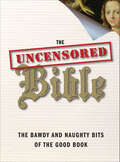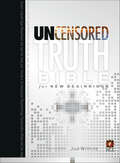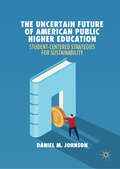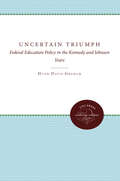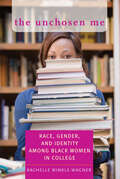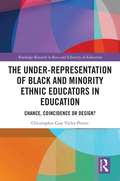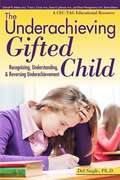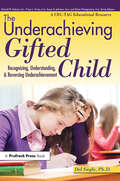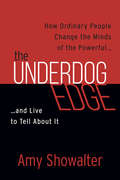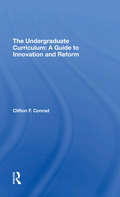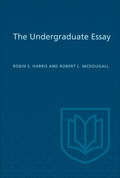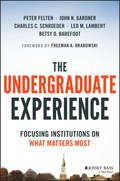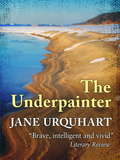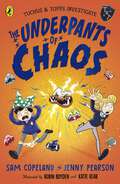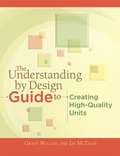- Table View
- List View
The Ultimate Small-Group Reading How-To Book: Building Comprehension Through Small-Group Instruction
by Gail Saunders-SmithAs students gain confidence and skills in guided reading, what is the next step to helping them become strong, independent readers? Small-group reading sessions. By working in small groups, students will be able to explore longer text and build their literacy skills with confidence. Literacy expert Gail Saunders-Smith demonstrates through the methods in this book how educators can advance students from small-group reading to silent reading, all while building reading comprehension.Ideal for teachers of emergent readers, The Ultimate Small-Group Reading How-To Book demonstrates how to develop successful readers through step-by-step, small-group reading instruction that focuses on vocabulary, comprehension, and fluency. Inside are tools for teachers to help them:Set up small-group mini-lessons and discussion of textsProvide tools for students to help investigate narrative textsEngage students to evaluate expository textsDevelop students’ skills in defining literary elements such as characters, setting, and plotAnd much moreHelp students become independent readers with these strategies for use before, during, and after guided reading!
The Ultimate Startup Book: Find Your Big Idea; Write Your Business Plan; Master Sales and Marketing
by Christine Harvey Kevin Duncan John Sealey Iain MaitlandIf you want to be the best, you have to have the right skillset. From generating ideas and creating business plans to sales and marketing, THE ULTIMATE STARTUP BOOK is a dynamic collection of tools, techniques, and strategies for success. Discover the main themes and key ideas you need and bring it all together with practical exercises.This is your complete course in entrepreneurship. ABOUT THE SERIESULTIMATE books are for managers, leaders, and business executives who want to succeed at work. From marketing and sales to management and finance, each title gives comprehensive coverage of the essential business skills you need to get ahead in your career. Written in straightforward English, each book is designed to help you quickly master the subject, with fun quizzes embedded so that you can check how you're doing.
The Ultimate Startup Book: Find Your Big Idea; Write Your Business Plan; Master Sales and Marketing
by Christine Harvey Kevin Duncan Iain MaitlandIf you want to be the best, you have to have the right skillset. From generating ideas and creating business plans to sales and marketing, THE ULTIMATE STARTUP BOOK is a dynamic collection of tools, techniques, and strategies for success. Discover the main themes and key ideas you need and bring it all together with practical exercises.This is your complete course in entrepreneurship. ABOUT THE SERIESULTIMATE books are for managers, leaders, and business executives who want to succeed at work. From marketing and sales to management and finance, each title gives comprehensive coverage of the essential business skills you need to get ahead in your career. Written in straightforward English, each book is designed to help you quickly master the subject, with fun quizzes embedded so that you can check how you're doing.
The Ultimate Student Teaching Guide
by Kisha N. Daniels Gerrelyn C. Patterson Yolanda L. DunstonConcise and focused on practical strategies, this engaging, lighthearted guide provides teacher candidates a road map for negotiating the complex and diverse terrain of pre-K through 12 schools, while providing opportunities to develop the skills of reflection that are crucial to becoming a successful practitioner. The Ultimate Student Teaching Guide, Second Edition, by Kisha N. Daniels, Gerrelyn C. Patterson, and Yolanda L. Dunston, provides practical, research-based, field-tested strategies that student teachers can immediately apply as they encounter school concerns, solve classroom challenges, negotiate social conflicts, and, new to this edition, navigate the job search and interview process. Thoroughly updated throughout, the Second Edition includes expanded coverage of workplace professionalism, an introduction to accreditation and the Common Core standards, and more.
The Ultimate: Your Self Revealed
by Marie S. WattsWhat is the Ultimate? At first glance the title to this book, The Ultimate, may seem to present a challenge, or it could appear presumptuous. However, the answer to the above question will disclose that neither of these attitudes is implied.The Ultimate is that glorious point in revelation where the long struggle for Spiritual understanding is ended, where ever-present perfection is realized to be the entirety of the Life, Soul, Being, and Body of the seeker. Of course this does not mean that all revelation has come to an end. Rather it is from this point that the Truth reveals Itself from within in ever-increasing Light and clarity. Here you stand in the Light as the Light; and the Light is Consciousness, YOUR CONSCIOUSNESS.In the Ultimate there is no dualism. Here there is conscious awareness that God is in the Universe as the Universe. God is recognized to be the Life, Mind, Soul, Substance, and Body of all that has existence. This infinite Self-containment includes YOU, your entire Life, Mind, Soul, Substance, Being, Body, and Experience.
The Unbearable Lightness of Being (SparkNotes Literature Guide Series)
by SparkNotesThe Unbearable Lightness of Being (SparkNotes Literature Guide) by Milan Kundera Making the reading experience fun! Created by Harvard students for students everywhere, SparkNotes is a new breed of study guide: smarter, better, faster. Geared to what today's students need to know, SparkNotes provides: *Chapter-by-chapter analysis *Explanations of key themes, motifs, and symbols *A review quiz and essay topicsLively and accessible, these guides are perfect for late-night studying and writing papers
The Unbeatable Lily Hong
by Diana MaA smart, funny, and heartfelt middle grade novel about Lily Hong’s attempts to save her parents’ Chinese school and the town’s community center using all the resources she has—devoted friends, ingenuity, a passion for filmmaking, mediocre dance moves (at best), and perhaps even her archnemesis.If there’s one thing Lily Hong can’t stand, it’s being second best. That’s why she and Max Zhang have been bitter rivals ever since he swooped into town as the new kid with the cool clothes and his fancy downtown Chinese school and showed her up in the fifth-grade reading challenge. She had wanted to be the one to win the pizza party for their class. Okay, so that was two years ago . . . her best friends Kelli and Lauren didn’t totally get it, but they were on her side. And that’s why they agreed to help Lily with her submission for the Clarktown’s Got Talent video competition. Filmmaking is Lily’s passion—which means winning is more important to her than ever.Unfortunately, finding time to work on her video submission is proving harder than ever. In addition to doing regular homework and attending the Chinese school her parents own and run out of the Clarktown Community Center, Lily’s been getting weird vibes from her parents lately and she can tell something is up. Then her mom announces that the Clarktown Community Center is having its first showcase, and the students of Hong Chinese Academy will be performing as a group—traditional Chinese dance!Lily is more confused than anything else—the community center is practically falling apart and they think this is a good time to put on a show? Could it be that the community center is in trouble and the only way to save it is to make the showcase a huge success? Lily has no choice. She’ll have to juggle the video competition and the art of Chinese dance simultaneously. But when Max Zhang unexpectedly shows up in her class at Chinese school with his perfect Mandarin and his surprisingly good dance skills, Lily might just have to embrace her longtime rival as a key part of her plan to save the community center.
The Unbreakable Student: 6 Rules for Staying Sane at University
by Nic Hooper'Equal parts practical, funny and illuminating - belongs on the required reading list for life' - Sarah Knight, internationally bestselling author of Get Your Sh!t TogetherSo, you're starting university - you've learnt what to pack, where to socialise, how to cook (sort of)... but what about how to look after your mental health?University is a whirlwind of exciting, fresh experiences. But it can also be overwhelming. You're in a strange new environment and faced with the pressure to make friends, complete difficult assignments, stay healthy, manage your finances and so much more, all while being away from your loved ones. In this time of massive change, looking after your mental wellbeing is more important than ever.Nic Hooper has witnessed the student mental health crisis unfolding every day on campus and is determined to help. A psychologist with fifteen years' experience teaching and mentoring young adults, The Unbreakable Student is his guide to navigating your university years and staying sane using six simple rules:· Using exercise to stay healthy in body and mind· Learning to positively challenge yourself· Connecting with your peers· Mindfully embracing the moment· Managing self-critical thoughts and vulnerability· Giving to others and taking positive actionAccessible and inspirational, The Unbreakable Student is the self-care guide that every university student needs.
The Unbreakable Student: 6 Rules for Staying Sane at University
by Nic Hooper'Equal parts practical, funny and illuminating - belongs on the required reading list for life' - Sarah Knight, internationally bestselling author of Get Your Sh!t TogetherSo, you're starting university - you've learnt what to pack, where to socialise, how to cook (sort of)... but what about how to look after your mental health?University is a whirlwind of exciting, fresh experiences. But it can also be overwhelming. You're in a strange new environment and faced with the pressure to make friends, complete difficult assignments, stay healthy, manage your finances and so much more, all while being away from your loved ones. In this time of massive change, looking after your mental wellbeing is more important than ever.Nic Hooper has witnessed the student mental health crisis unfolding every day on campus and is determined to help. A psychologist with fifteen years' experience teaching and mentoring young adults, The Unbreakable Student is his guide to navigating your university years and staying sane using six simple rules:· Using exercise to stay healthy in body and mind· Learning to positively challenge yourself· Connecting with your peers· Mindfully embracing the moment· Managing self-critical thoughts and vulnerability· Giving to others and taking positive actionAccessible and inspirational, The Unbreakable Student is the self-care guide that every university student needs.
The Uncensored Bible: The Bawdy and Naughty Bits of the Good Book
by John Kaltner Steven McKenzieStrange but True Bible FactsDid you know:that King David swore like a sailor?that the Book of Ecclesiastes encourages drinking, especially beer?that mandrakes were the biblical equivalent of Viagra®?that the law of Moses prescribes bikini waxing?that Joseph's "coat of many colors" might have actually been a dress?that Eve might have been created, not from Adam's rib, but from something a little lower down?Discover all this, and more, in The Uncensored Bible.
The Uncensored Truth Bible for New Beginnings
by Jud WilhiteAs the pastor of Central Christian Church in Las Vegas, Jud Wilhite encounters new Christians every single day. One of the greatest needs new believers have is a resource for understanding the Christian faith and the Bible in a straightforward and applicable guide. The Uncensored Truth Bible for New Beginnings fills that need and show an uncompromising commitment to God's Word and the extent of His grace: the radical, amazing, overwhelming favor and forgiveness of God available to all. The New Living Translation is Jud's preferred Bible translation because he believes it is the easiest for new believers to understand. This fastest growing Bible translation is the work of 90 Bible scholars over a seven-year period and is known for accurately communicating the meaning of the original ancient Hebrew and Greek texts in clear and concise language. Jud hopes The Uncensored Truth Bible for New Beginnings will help you apply the gift of God's words to your life along with some thoughts to help you understand it more quickly and deeply. He gives you tools and resources to help navigate the deep waters of this living document. As you dig into God's words, the encouragement and truth you receive will literally change your life and the world! Key Features Include:A 32-page Introduction in which Jud provides 6 helpful articles on how to understand the Bible, overviews of the Old and New Testaments, and faith as a lifelong journeyBook Introductions, including the author, key people and verses, themes, and the date it was written for each book of the Bible9 Major Uncensored Truth Sections, which guide readers to understand the core beliefs of Christianity-God, Jesus Christ, the Holy Spirit, the Word of God, salvation, church, living the Christian life, angels and demons, Jesus' return, and heaven and hellCallout Passages of Scripture that have meant the most to Jud for different reasons in various seasons of lifeAnd featuring the reliable and easy-to-read New Living Translation
The Uncertain Future of American Public Higher Education: Student-Centered Strategies for Sustainability
by Daniel M. JohnsonThis book addresses the costly non-sustainable policies, programs, practices, and priorities currently driving the tuition crisis in American public higher education. In this era of growing competition among public colleges and universities for more students and higher rankings, their leaders and governing boards have lost sight of student-centered missions in favor of more and greater non-education related amenities, facilities, programs, and practices that have added substantially to the cost of a college degree without increasing its quality. This book is an appeal to all interested taxpaying citizens, public officials, governors, governing boards, and university presidents to take a second look at these costly decisions and begin a new era of placing the higher education needs and interests of students above all. We have created this tuition crisis; now we must solve it.
The Uncertain Triumph: Federal Education Policy in the Kennedy and Johnson Years
by Hugh Davis GrahamUsing the Kennedy and Johnson archives to analyze the evolution of educational policy from the perspective of the executive branch, Graham finds that the central theme was executive planning through presidential task forces. Mission agencies, clientele groups, and congressional committees produced a cascade of education programs in the 1960s as the administration was collapsing under the weight of the Vietnam war, inflation, and collective violence, yet the last two decades have witnessed a decline in test scores and basic literacy.Originally published in 1984.A UNC Press Enduring Edition -- UNC Press Enduring Editions use the latest in digital technology to make available again books from our distinguished backlist that were previously out of print. These editions are published unaltered from the original, and are presented in affordable paperback formats, bringing readers both historical and cultural value.
The Unchosen Me: Race, Gender, and Identity among Black Women in College
by Rachelle Winkle-WagnerRacial and gender inequities persist among college students, despite ongoing efforts to combat them. Students of color face alienation, stereotyping, low expectations, and lingering racism even as they actively engage in the academic and social worlds of college life. The Unchosen Me examines the experiences of African American collegiate women and the identity-related pressures they encounter both on and off campus.Rachelle Winkle-Wagner finds that the predominantly white college environment often denies African American students the chance to determine their own sense of self. Even the very programs and policies developed to promote racial equality may effectively impose "unchosen" identities on underrepresented students. She offers clear evidence of this interactive process, showing how race, gender, and identity are created through interactions among one’s self, others, and society. At the heart of this book are the voices of women who struggle to define and maintain their identities during college. In a unique series of focus groups called "sister circles," these women could speak freely and openly about the pressures and tensions they faced in school. The Unchosen Me is a rich examination of the underrepresented student experience, offering a new approach to studying identity, race, and gender in higher education.
The Uncivil War
by Sheila S. KlassEven with her father as principal, Asa Andersen is certain that sixth grade will be perfect, until a new boy in school starts making fun of her name and the baby her mother is expecting is born prematurely.
The Under-Representation of Black and Minority Ethnic Educators in Education: Chance, Coincidence or Design? (Routledge Research in Race and Ethnicity in Education)
by Chris Guy Vieler-PorterThe Under-Representation of Black and Minority Ethnic Educators in Education evidences that discrimination at an individual, institutional and structural level is still experienced in the leadership of children’s learning. The analysis evaluates the extent to which under-representation is a result of chance, coincidence or design. Based on original research using a mixed-methods approach, and drawing on Critical Race Theory this book examines the under-representation of Black and minority ethnic (BAME) educators in education. It identifies over 40 separate codes emerging from interviews with BAME leaders in children’s learning. These codes include surveillance, isolation, awareness of their position, the need to be better, professional development, the complexity of racism and the difficulties of talking about racism. The book contributes to educational leadership in questioning the extent to which equitable outcomes can be delivered when the education service is itself a site and source of inequality and discrimination. It brings to front the suppressed narratives of under-representation of people of colour and offers insights based on comprehensive data collection. This book will be of great interest for academics, researchers, and post-graduate students in the fields of education management and leadership, Critical Race Theory, and the Sociology of Education.
The Underachieving Gifted Child
by Del SiegleWhy are some gifted children willing to tackle new challenges whereas others seem insecure or uninterested? Why do some gifted students achieve while others become caught in a cycle of underachievement? Are there strategies teachers and parents can implem
The Underachieving Gifted Child: Recognizing, Understanding, and Reversing Underachievement (A CEC-TAG Educational Resource)
by Del SiegleWhy are some gifted children willing to tackle new challenges whereas others seem insecure or uninterested? Why do some gifted students achieve while others become caught in a cycle of underachievement? Are there strategies teachers and parents can implement that promote an achievement-oriented attitude? The Underachieving Gifted Child: Recognizing, Understanding, and Reversing Underachievement answers these important questions. Although there are many factors that contribute to achievement, achievement-oriented students exhibit four key traits: they believe that they have the skills to perform well, they expect that they can succeed, they believe what they are doing is meaningful, and they set realistic expectations and implement strategies to successfully complete their goals. This book offers specific strategies to help increase student achievement by improving students' attitudes in these four important areas.
The Underdog Edge: How Ordinary People Change the Minds of the Powerful . . . and Live to Tell About It
by Amy ShowalterA prominent consultant reveals secrets to help you influence and persuade others—even when you aren&’t in a position of power. We all have occasions in which we want or need to persuade someone of greater clout, prestige, or authority to see things our way. There are books that show how to effect change from a leadership position or how to work with peers within your own organization—but what can you do when you need to exert &“upward influence&” with decision makers who can help you achieve your goals? In this book, a popular speaker and successful consultant with expertise in grassroots efforts shows which tactics are most successful when you&’re the underdog. She also shares real-world stories of everyday people who have achieved persuasion success in politics and business with someone up the food chain, the peer-reviewed science behind their success—as well as insights from those whose minds they changed.
The Undergraduate Curriculum: A Guide To Innovation And Reform
by Clifton F. ConradRecent pressures on undergraduate education have led to major—but often untutored—attempts to revitalize curricula. This comprehensive handbook is designed to aid faculty, administrators, and students engaged in curriculum reform at the undergraduate level. The emphasis throughout is on planning. Professor Conrad proposes a systems model for curriculum planning and examines four major areas: general and liberal education, area concentration, experiential learning, and calendar and degree programs. In each of these areas he identifies key issues, discusses the strengths and weaknesses of different approaches, provides a historical context, outlines major trends, and describes a variety of innovations that institutions might adopt. The result is a practical, usable book.
The Undergraduate Essay
by Robin Harris Robert McDougallThe Undergraduate Essay sets before the student examples of writing from which he can learn what to do and why. Part I of this book consists of six complete essays of average undergraduate length. All are specimens rather than models; these essays are well-written, but they are not faultless. In Part II, the authors define and discuss the principles of sound essay writing by considering in turn the plan, paragraph structure, sentence structure, diction, punctuation, and under the title "The Conventions of Scholarship" the use of footnotes and the preparation of a bibliography. Throughout, the student is urged to study examples, and to think critically and constructively on the problems raised. It follows that The Undergraduate Essay makes no attempt to do the work either of the student of the instructor. It is a text which invites, indeed demands, the co-operative effort of both.
The Undergraduate Experience: Focusing on What Matters Most
by John N. Gardner Betsy O. Barefoot Peter Felten Leo M. Lambert Charles C. Schroeder Freeman A. HrabowskiA clear, practical framework for getting higher education back on track The Undergraduate Experience is a guide for significantly improving student learning and institutional performance in the rapidly changing world of higher education. Written by recognized experts in undergraduate education, this book encourages college and university leaders to rethink current practices that fragment the student experience, and to focus on creating powerful, integrated undergraduate learning for all students. Drawing from their own deep experience and the latest research, the authors reveal key principles that enable institutional change and enhance student outcomes in any higher education setting. Coverage includes high-impact practices for engagement, the importance of strategic leadership, the necessity of setting and maintaining high expectations, and insight on fostering excellence through systematic planning. Through its core themes and action principles, this book can be a valuable resource for faculty, staff, administrators, and governing boards at all types of postsecondary institutions. The book provides a practical framework for achieving excellence in undergraduate education by focusing on: Learning Relationships Expectations Alignment Improvement Leadership The value of an undergraduate education is under greater scrutiny than ever before, and campus leaders must be able to convey the value of their institutions to students, boards, donors, and legislators. Is a college or university degree worth the increasing cost? Are today's students academically adrift? What's the difference between a degree and an education? Responding to these questions requires focused action by individuals and institutions. The Undergraduate Experience offers practical guidance for creating and sustaining excellence in the face of disruption and change in higher education.
The Underpainter
by Jane UrquhartThe Underpainter is a novel of interwoven lives in which the world of art collides with the realm of human emotion. It is the story of Austin Fraser, an American painter now in his later years, who is haunted by memories of those whose lives most deeply touched his own, including a young Canadian soldier and china painter and the beautiful model who becomes Austin's mistress. Spanning decades, the setting moves from upstate New York to the northern shores of two Great Lakes; from France in World War One to New York City in the '20s and '30s. Brilliantly depicting landscape and the geography of the imagination, The Underpainter is Jane Urquhart's most accomplished novel to date.
The Underpants of Chaos (Tuchus & Topps Investigate #1)
by Jenny Pearson Sam Copeland"I should have realised that there was going to be something SERIOUSLY weird about a town called Little STRANGEhaven."Something BAD is happening at Little Strangehaven Primary.What are the peculiar SHIVERS that keep striking the school, bringing Strangeness in their wake -from uncontrollable ballroom dancing to an attack by military chickens?Spy-detective Agatha Topps is determined to find out. She's the only person who doesn't forget the Strangeness as soon as it's over. At least, until new boy Lenny Tuchus turns up and remembers too.Their spy-detectoring leads them to the Book of Chaos, an ancient text which has been hidden away in the Room of Forbidden and Dangerous Books. Can Agatha and Lenny fight off attacks from evil underpants and Transylvanian gargoyles to stop the SHIVERS before their town is sucked into oblivion?Because power lies in books - especially this one . . .The perfect story for 7 to 9-year-olds (or STRANGE adults) and fans of Ben Miller, David Walliams and Tom Fletcher. Packed with hilarious illustrations and easy-to-read text, discover the secrets of Little Strangehaven.
The Understanding by Design Guide to Creating High-Quality Units
by Grant Wiggins Jay McTigheThis guide is intended for K-16 educators either individuals or groups who may have received some training in Understanding by Design and want to continue their work independently; those who've read Understanding by Design and want to design curriculum units but have no access to formal training; graduate and undergraduate students in university curriculum courses; and school and district administrators, curriculum directors, and others who facilitate Understanding by Design work with staff. Users can go through the modules in sequence or skip around, depending on their previous experience with UbD and their preferred curriculum design style or approach. Unit creation, planning, and adaptation are easier than ever with the accompanying downloadable resources, including the Understanding by Design template set up as a fillable PDF form, additional worksheets, examples, and FAQs about the module topics that speak to Understanding by Design novices and veterans alike.
